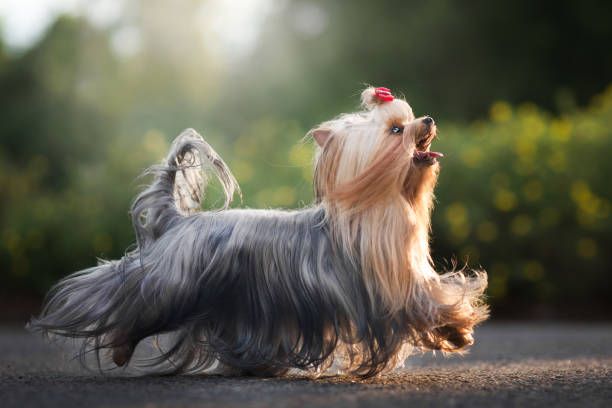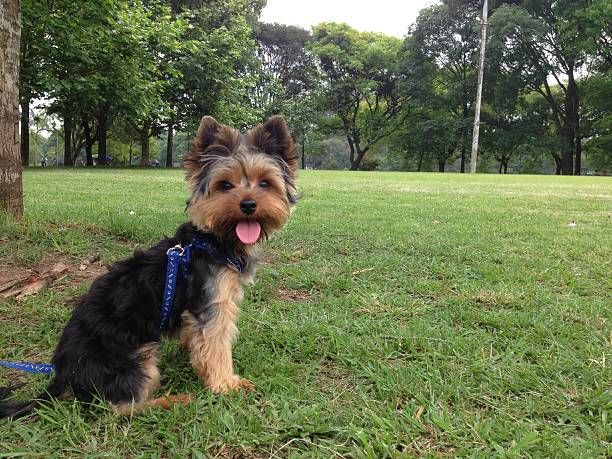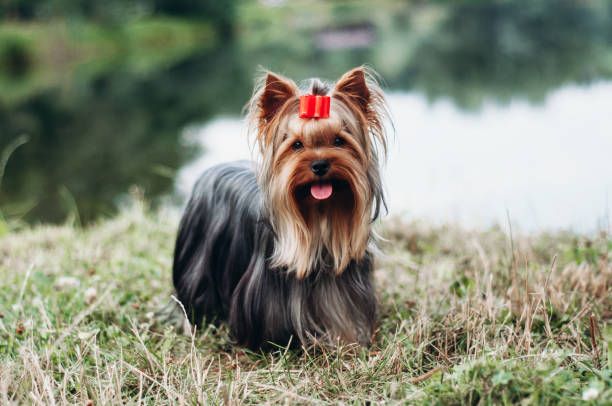Origin History of the Yorkshire Terrier:
The Yorkshire Terrier is a beloved and iconic breed with a fascinating and unique history. These small dogs have been around since the mid-1800s, when they were developed in Yorkshire, England. The breed was created by crossing several types of terriers, including the English Black and Tan Toy Terrier, the Skye Terrier, and the Waterside Terrier. It is thought that these dogs were brought to England from Scotland by workers looking for jobs during the Industrial Revolution.
In 1861, a Yorkshire Terrier was shown in a bench show as a broken-haired Scotch Terrier. A dog named Huddersfield Ben, born in 1865, became a popular show dog and is considered to be the father of the modern Yorkshire Terrier. The breed acquired its name in 1870 because that is where most of its development had taken place. The first Yorkshire Terrier breed club in England was formed in 1898.
Yorkshire Terriers were first registered in the British Kennel Club stud book in 1874. They were able to compete in dog shows as early as 1878. In those early shows, Yorkshire Terriers classes were divided by weight — under 5 pounds and 5 pounds and over. Eventually, exhibitors settled on one class with an average of between 3 and 7 pounds.
The earliest record of a Yorkshire Terrier being born in the U.S. was in 1872. Today, they are one of the most popular toy breeds and are beloved for their intelligence, loyalty, and spunky personalities.

Yorkshire Terrier Appearance:
The Yorkshire Terrier is a small breed of dog that is easily recognizable by its long, silky coat and perky topknot. The breed’s size ranges from three to seven pounds and they typically stand no more than nine inches tall at the shoulder. Yorkies have a single coat that can be either long or short, and the color is usually a steel blue with a bright golden head. The tan color is darker at the root and can extend up to the ears, though no black hairs should be mixed in with the tan. The breed’s signature look is completed with a long headfall, hair that falls over the face, and tan legs. The coat of a show dog typically reaches all the way to the floor! Grooming a long-haired Yorkie is not an easy task, and requires daily brushing to help prevent matting, as well as regular baths.
Diet and Nutrition:
Yorkshire Terriers are small, active dogs that need the right nutrition to stay healthy and happy. To ensure your Yorkie is getting the right nutrients, it’s important to understand the dietary needs of the breed, so that you can make informed decisions about their health.
When it comes to diet, Yorkies should be fed high-quality dry food specifically designed for small breeds. This will provide the right balance of nutrients, vitamins, and minerals that are essential for your Yorkie’s health and development. You can also supplement their diet with fresh fruits and vegetables, as well as cooked meat and fish. As with all breeds, it’s important to limit treats and only use them as rewards for good behavior.
It’s important to also monitor your Yorkie’s weight, as this breed is prone to obesity. You can do this by regularly weighing your pup and making sure that their food portions are appropriate for their size. If you have any concerns about your Yorkie’s diet or nutrition needs, it’s best to consult with your veterinarian. They can provide expert advice on the best diet and nutrition plan for your pup.

Common Health Issues Affecting Yorkshire Terriers:
Yorkshire Terriers are a lively and friendly breed of dog, but like all dogs, they can be prone to certain health conditions. While the vast majority of Yorkies are healthy, there are some common health issues that owners should be aware of.
One of the most common health issues facing Yorkshire Terriers is patellar luxation, which is the dislocation of the kneecap. This can be painful and lead to lameness if not treated promptly. Additionally, Yorkies are also at risk of collapsing trachea, which is a condition that affects the windpipe and can cause breathing difficulties.
Many Yorkies also suffer from dental problems, including periodontal disease and tooth decay, due to their small mouths and crowded teeth. It’s important to provide regular dental care to keep your pup’s teeth and gums healthy.
Finally, another health issue that can affect Yorkies is Legg-Calve-Perthes Disease, which is an abnormality in the hip joint. This can cause pain and lameness in the hind legs, and can require surgery to correct.
These are just a few of the common health issues that Yorkies can face. It’s important to provide the best care possible to ensure your pup lives a long, healthy life. Regular checkups with your vet and monitoring for any signs of illness can help you to keep your pup in the best of health.
Interesting Facts About Yorkshire Terriers:
Yorkshire Terriers are one of the most popular dog breeds in the world, and they have a long history of being beloved companions. Here are some interesting facts about these pint-sized pooches:
1. The breed originated in Yorkshire, England, during the industrial revolution, and it was recognized as a breed by the British Kennel Club in 1874.
2. They are one of the smallest dog breeds, and the American Kennel Club (AKC) standard for the breed is for it to weigh between 4 and 7 pounds.
3. The Yorkshire Terrier is known for its luxurious long, silky hair and its bright personality. They are affectionate and loyal, and they make great watchdogs because they are always on the lookout for trouble.
4. They are also quite independent and can be stubborn when they want to be. This is why it is important to start training them early and be consistent with it.
5. Despite their small size, Yorkshire Terriers can be surprisingly active and need daily exercise. They love to play and explore, so be sure to give them plenty of opportunities to do so.
6. Yorkies are known to be fairly healthy, but they are prone to some health problems such as patellar luxation and tracheal collapse. It is important to keep up with regular vet appointments to ensure your pooch stays healthy and happy.
7. Yorkshire Terriers are also known for their glamorous coats, and they are relatively easy to groom. However, it is important to brush the coat regularly to prevent matting and tangles.
8. These pint-sized pooches have big personalities, and they make great family pets. They are loyal and loving, and they love to be the center of attention.

Where to Adopt or Buy:
If you’re looking to adopt or buy a Yorkshire Terrier, the first step is to do some research. There are a number of reputable breeders and rescue organizations dedicated to Yorkies, so it’s important to find one that is reputable and ethical. The American Kennel Club provides a list of certified breeders, which is a great resource to start with. When meeting a breeder, ask questions, ask to see the parents of the puppy, and ensure that the puppy has been properly cared for and socialized. Additionally, it’s a good idea to ask for proof of health and vaccination records.
You can also look into local rescue organizations dedicated to Yorkies. These rescues typically have a variety of Yorkies available for adoption and are always looking for families to give their Yorkies a loving home. When considering adoption, make sure to ask questions about the dog’s background and health, ask to meet the dog in person, and be prepared for a home visit from the rescue organization.
There is also the option of buying a Yorkie from a pet store, however, this is not recommended. Many pet store puppies come from puppy mills and have not been properly socialized or cared for. Additionally, pet store puppies may have health issues and may not come with registration papers or proof of vaccinations.
No matter which route you take, adopting or buying a Yorkshire Terrier is a big responsibility. They require a lot of time, care, and attention, and should be taken seriously. With the right research and preparation, you can find the perfect Yorkie for your family!

Conclusion:
The Yorkshire Terrier is a charming and entertaining breed of dog. They have spunky personalities and glamorous coats that will make them the star of any show. They are loyal and affectionate towards their people and can make great companions for both children and adults alike. Yorkshire Terriers are also quite small, so they make great apartment dogs, as long as they get plenty of exercise and attention. However, they can also be quite vocal and territorial if not properly trained, so it is important to socialize them early and set boundaries.
All in all, the Yorkshire Terrier is a charming and lively breed of dog that can be a great companion for the right person. Their spunky and bold personality can be a joy to be around, and their glamorous coat and size make them a delight to behold. With the proper attention and care, the Yorkshire Terrier can be a loving and loyal pet for many years to come.
FAQ:
Q: What is the average lifespan of a Yorkshire Terrier?
A: The average lifespan of a Yorkshire Terrier is 11 to 15 years. However, with proper nutrition and regular veterinary care, some Yorkies can live for up to 20 years!
Q: How much exercise does a Yorkshire Terrier need?
A: Yorkshire Terriers are energetic, active little dogs and need a daily walk and lots of interactive play to stay fit. They also enjoy agility and tracking activities.
Q: Are Yorkshire Terriers good with other animals?
A: Yorkshire Terriers can be friendly and tolerant of other animals, including cats, if they are raised with them. However, they may be aggressive towards strange animals and can be possessive of their owners if a new pet is introduced into the home.
Q: How much attention do Yorkshire Terriers need?
A: Yorkies are very devoted to their owners, and require a great deal of attention and companionship. They don’t do well with long hours of being left alone and should not be left alone for extended periods of time.
























